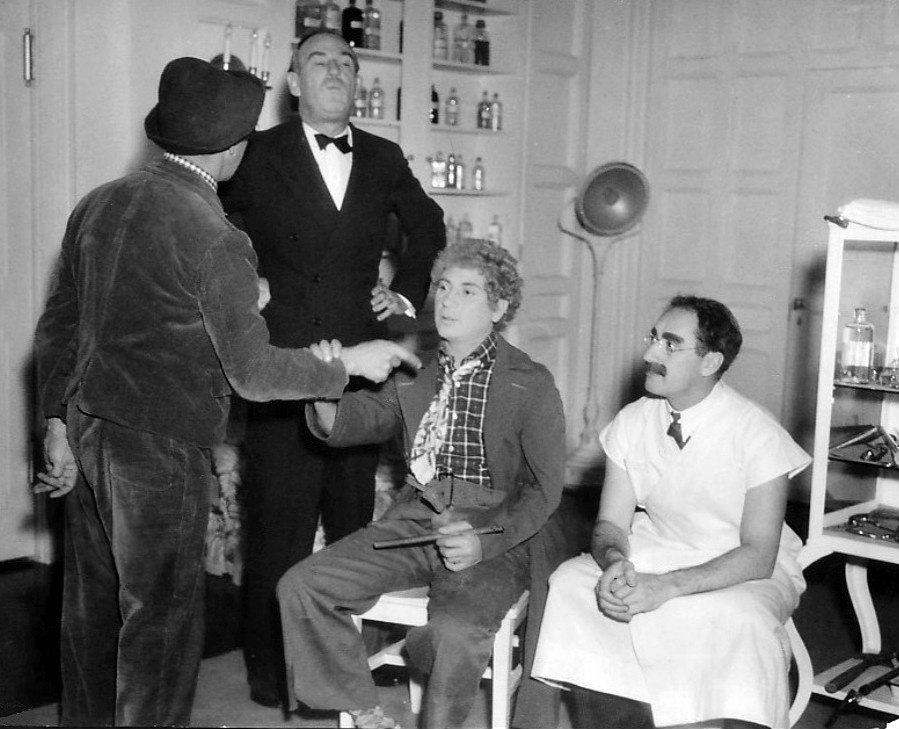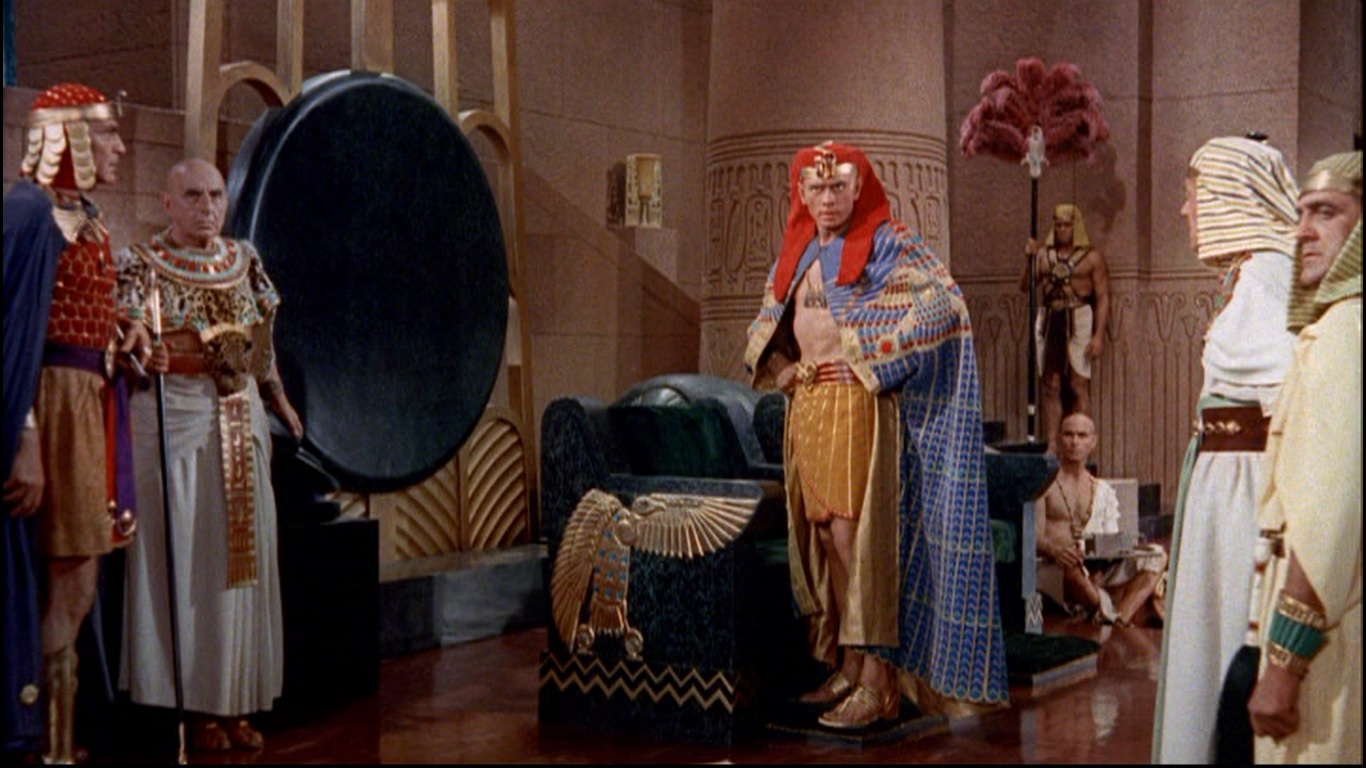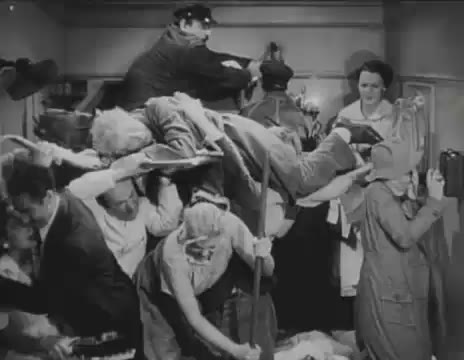|
A Day At The Races (film)
''A Day at the Races'' is a 1937 American comedy film, and the seventh film starring the Marx Brothers (Groucho Marx, Harpo Marx and Chico Marx), with Allan Jones, Maureen O'Sullivan and Margaret Dumont. Like their previous Metro-Goldwyn-Mayer feature '' A Night at the Opera'', this film was a major hit. Plot The Standish Sanitarium, owned by Judy Standish, has fallen on hard times. Banker J.D. Morgan, who owns a nearby race track, hotel and nightclub, holds the mortgage on the sanitarium and is attempting to purchase it in order to convert the building into a casino. Judy's faithful employee Tony, suggests asking financial help from the wealthy patient Mrs. Emily Upjohn, who is a hypochondriac. After being pronounced healthy by the sanitarium's doctors, Mrs. Upjohn threatens to leave the Sanitarium for treatment by Dr. Hugo Z. Hackenbush. Tony overhears her praise of Hackenbush, who is, unknown to her, a horse doctor. When Tony lies to Mrs. Upjohn, telling her that Hackenbush ha ... [...More Info...] [...Related Items...] OR: [Wikipedia] [Google] [Baidu] |
Sam Wood
Samuel Grosvenor Wood (July 10, 1883 – September 22, 1949) was an American film director and producer who is best known for having directed such Hollywood hits as ''A Night at the Opera (film), A Night at the Opera'', ''A Day at the Races (film), A Day at the Races'', ''Goodbye, Mr. Chips (1939 film), Goodbye, Mr. Chips'', ''The Pride of the Yankees'', and ''For Whom the Bell Tolls (film), ''For Whom the Bell Tolls'''' and for his uncredited work directing parts of ''Gone with the Wind (film), Gone with the Wind''. He was also involved in a few acting and writing projects. As a youth, Wood developed an enthusiasm for physical fitness that persisted into his senior years and influenced his interest in making sports-themed films. Wood advanced from making largely competent yet routine pictures in the 1920s and 1930s to directing several highly regarded works during the 1940s at the peak of his abilities, among them ''Kings Row'' (1942) and ''Ivy (1947 film), Ivy'' (1947). Wood ... [...More Info...] [...Related Items...] OR: [Wikipedia] [Google] [Baidu] |
Douglass Dumbrille
Douglass Rupert Dumbrille (October 13, 1889 – April 2, 1974) was a Canadian actor who appeared regularly in films from the early 1930s. Life and career Douglass Dumbrille ( ) was born in Hamilton, Ontario. As a young man, he was employed as a bank clerk in Hamilton while pursuing an interest in acting. He eventually left banking for the theatre, finding work with a stock company that led him to Chicago, Illinois, and another that toured the United States. In 1913, the East Coast film industry was flourishing and that year he appeared in the film ''What Eighty Million Women Want'', but it would be another 11 years before he appeared on screen again. In 1924, he made his Broadway debut and worked off and on in the theatre for several years while supplementing his income by selling such products as car accessories, tea, insurance, real estate, and books. During the Great Depression, Dumbrille resumed his screen career in Hollywood, where he specialized in playing secondar ... [...More Info...] [...Related Items...] OR: [Wikipedia] [Google] [Baidu] |
Steeplechase (horse Racing)
A steeplechase is a distance horse race in which competitors are required to jump diverse fence and ditch obstacles. Steeplechasing is primarily conducted in Ireland (where it originated), the United Kingdom, Canada, United States, Australia, and France. The name is derived from early races in which orientation of the course was by reference to a church steeple, jumping fences and ditches and generally traversing the many intervening obstacles in the countryside. Modern usage of the term "steeplechase" differs between countries. In Ireland and the United Kingdom, it refers only to races run over large, fixed obstacles, in contrast to "hurdle" races where the obstacles are much smaller. The collective term "jump racing" or "National Hunt racing" is used when referring to steeplechases and hurdle races collectively (although, properly speaking, National Hunt racing also includes some flat races). Elsewhere in the world, "steeplechase" is used to refer to any race that involves j ... [...More Info...] [...Related Items...] OR: [Wikipedia] [Google] [Baidu] |
Blackface
Blackface is a form of theatrical makeup used predominantly by non-Black people to portray a caricature of a Black person. In the United States, the practice became common during the 19th century and contributed to the spread of racial stereotypes such as the "happy-go-lucky darky on the plantation" or the " dandified coon". By the middle of the century, blackface minstrel shows had become a distinctive American artform, translating formal works such as opera into popular terms for a general audience. Early in the 20th century, blackface branched off from the minstrel show and became a form in its own right. In the United States, blackface declined in popularity beginning in the 1940s and into the civil rights movement of the 1950s and 1960s,Clark, Alexis.How the History of Blackface Is Rooted in Racism. ''History''. A&E Television Networks, LLC. 2019. and was generally considered highly offensive, disrespectful, and racist by the turn of the 21st century, though the practice ... [...More Info...] [...Related Items...] OR: [Wikipedia] [Google] [Baidu] |
Gabriel
In Abrahamic religions (Judaism, Christianity and Islam), Gabriel (); Greek: grc, Γαβριήλ, translit=Gabriḗl, label=none; Latin: ''Gabriel''; Coptic: cop, Ⲅⲁⲃⲣⲓⲏⲗ, translit=Gabriêl, label=none; Amharic: am, ገብርኤል, translit=Gabrəʾel, label=none; arc, ܓ݁ܰܒ݂ܪܺܝܐܝܶܠ, translit=Gaḇrīʾēl; ar, جِبْرِيل, Jibrīl, also ar, جبرائيل, Jibrāʾīl or ''Jabrāʾīl'', group="N" is an archangel with power to announce God's will to men. He is mentioned in the Hebrew Bible, the New Testament, and the Quran. Many Christian traditions — including Anglicanism, Eastern Orthodoxy, and Roman Catholicism — revere Gabriel as a saint. In the Hebrew Bible, Gabriel appears to the prophet Daniel to explain his visions (Daniel 8:15–26, 9:21–27). The archangel also appears in the Book of Enoch and other ancient Jewish writings not preserved in Hebrew. Alongside the archangel Michael, Gabriel is described as the guardian angel o ... [...More Info...] [...Related Items...] OR: [Wikipedia] [Google] [Baidu] |
Vienna
en, Viennese , iso_code = AT-9 , registration_plate = W , postal_code_type = Postal code , postal_code = , timezone = CET , utc_offset = +1 , timezone_DST = CEST , utc_offset_DST = +2 , blank_name = Vehicle registration , blank_info = W , blank1_name = GDP , blank1_info = € 96.5 billion (2020) , blank2_name = GDP per capita , blank2_info = € 50,400 (2020) , blank_name_sec1 = HDI (2019) , blank_info_sec1 = 0.947 · 1st of 9 , blank3_name = Seats in the Federal Council , blank3_info = , blank_name_sec2 = GeoTLD , blank_info_sec2 = .wien , website = , footnotes = , image_blank_emblem = Wien logo.svg , blank_emblem_size = Vienna ( ; german: Wien ; ba ... [...More Info...] [...Related Items...] OR: [Wikipedia] [Google] [Baidu] |
Hypochondriac
Hypochondriasis or hypochondria is a condition in which a person is excessively and unduly worried about having a serious illness. An old concept, the meaning of hypochondria has repeatedly changed. It has been claimed that this debilitating condition results from an inaccurate perception of the condition of body or mind despite the absence of an actual medical diagnosis. An individual with hypochondriasis is known as a hypochondriac. Hypochondriacs become unduly alarmed about any physical or psychological symptoms they detect, no matter how minor the symptom may be, and are convinced that they have, or are about to be diagnosed with, a serious illness. Often, hypochondria persists even after a physician has evaluated a person and reassured them that their concerns about symptoms do not have an underlying medical basis or, if there is a medical illness, their concerns are far in excess of what is appropriate for the level of disease. It is also referred to hypochondriaism which is ... [...More Info...] [...Related Items...] OR: [Wikipedia] [Google] [Baidu] |
A Night At The Opera (film)
''A Night at the Opera'' is a 1935 American comedy film starring the Marx Brothers (Groucho Marx, Harpo Marx and Chico Marx), and featuring Kitty Carlisle, Allan Jones, Margaret Dumont, Sig Ruman, and Walter Woolf King. It was the first of five films the Marx Brothers made under contract for Metro-Goldwyn-Mayer after their departure from Paramount Pictures, and the first after Zeppo left the act. The film was written by George S. Kaufman and Morrie Ryskind from a story by James Kevin McGuinness, with additional uncredited dialogue by Al Boasberg. The film was directed by Sam Wood. One of MGM's biggest hits at the 1935 box office, ''A Night at the Opera'' was selected in 1993 for preservation in the National Film Registry by the Library of Congress as being "culturally, historically, or aesthetically significant". [...More Info...] [...Related Items...] OR: [Wikipedia] [Google] [Baidu] |
Marx Brothers
The Marx Brothers were an American family comedy act that was successful in vaudeville, on Broadway, and in motion pictures from 1905 to 1949. Five of the Marx Brothers' thirteen feature films were selected by the American Film Institute (AFI) as among the top 100 comedy films, with two of them, '' Duck Soup'' (1933) and '' A Night at the Opera'' (1935), in the top fifteen. They are widely considered by critics, scholars and fans to be among the greatest and most influential comedians of the 20th century. The brothers were included in AFI's 100 Years... 100 Stars list of the 25 greatest male stars of Classical Hollywood cinema, the only performers to be included collectively. The brothers are almost universally known by their stage names: Chico, Harpo, Groucho, Gummo, and Zeppo. There was a sixth brother, the first born, named Manfred (Mannie), who died in infancy; Zeppo was given the middle name Manfred in his memory. The core of the act was the three elder brothers: C ... [...More Info...] [...Related Items...] OR: [Wikipedia] [Google] [Baidu] |
Comedy Film
A comedy film is a category of film which emphasizes humor. These films are designed to make the audience laugh through amusement. Films in this style traditionally have a happy ending (black comedy being an exception). Comedy is one of the oldest genres in film and it is derived from the classical comedy in theatre. Some of the earliest silent films were comedies, as slapstick comedy often relies on visual depictions, without requiring sound. When sound films became more prevalent during the 1930s, comedy films took another swing, as laughter could result from burlesque situations but also dialogue. Comedy, compared with other film genres, puts much more focus on individual stars, with many former stand-up comics transitioning to the film industry due to their popularity. In '' The Screenwriters Taxonomy'' (2017), Eric R. Williams contends that film genres are fundamentally based upon a film's atmosphere, character, and story. Therefore the labels "drama" and "comedy" are t ... [...More Info...] [...Related Items...] OR: [Wikipedia] [Google] [Baidu] |
Metro-Goldwyn-Mayer
Metro-Goldwyn-Mayer Studios Inc., also known as Metro-Goldwyn-Mayer Pictures and abbreviated as MGM, is an American film, television production, distribution and media company owned by amazon (company), Amazon through MGM Holdings, founded on April 17, 1924 and based in Beverly Hills, California. MGM was formed by Marcus Loew by combining Metro Pictures, Goldwyn Pictures, and Louis B. Mayer Productions, Louis B. Mayer Pictures into one company. It hired a number of well known actors as contract players—its slogan was "more stars than there are in heaven"—and soon became Hollywood's most prestigious film studio, producing popular musical films and winning many Academy Awards. MGM also owned film studios, movie lots, movie theaters and technical production facilities. Its most prosperous era, from 1926 to 1959, was bracketed by two productions of ''Ben-Hur (1959 film), Ben Hur''. After that, it divested itself of the Loews movie theater chain, and, in the 1960s, diversified ... [...More Info...] [...Related Items...] OR: [Wikipedia] [Google] [Baidu] |

_2_cropped.jpg)


.jpg)

